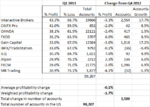Shakone
Senior member
- Messages
- 2,460
- Likes
- 665
Counter Violent, as one of the few who hasn't complained too much about slippage, could I respectfully request that folk take more care with that 95% statistic that's freely quoted, as if it were fact - that only 5% consistently win. I stand corrected if wrong, that is to say, unless there has been some recent factual evidence, which was released to back up that particular statistic.
In other words, & again with all respect, unless there is ever sound factual evidence that only 5% are consistent winners, can we please not continue to accept and quote such a statistic as if it were gospel?
OTOH, I can however find evidence that such a statistic is questionable ...to put it mildly.
For just one example, on Jan 9th Capital Spreads wrote in response to a question I posed: "there are no hard and fast rules and (you may be surprised to learn) some 65% of all trades taken by Capital Spreads are profitable for the clients." - which begs the question - just how have we arrived at the magic 95% statistic - *if* it's a valid one?
Yeah exactly! He should have said 99%, not 95% :whistling

